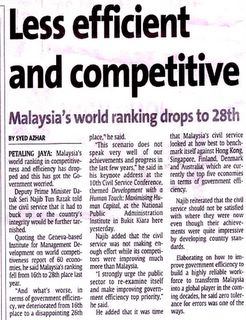
September 13, 2005, The Star, Nation, page 10
Malaysia's world ranking in competitiveness and efficiency has dropped. The Geneva-based Institute for Management Development on World Competitiveness survey of 60 economies has reported that Malaysia's competitiveness ranking fell from 16th as of last year to 28th place this year.
What's worse; in terms of government efficiencies, Malaysia has dropped to 26th place from 16th place.
Deputy Prime Minister was full of concern as he addessed the 10th Civil Service Conference at the National Public Administration Institute in Bukit Kiara yesterday.
"This scenario does not speak very well of our achievements and progress in the last few years. The civil service was not making enough effort while our competitors were improving much faster than Malaysia. The civil service had to buck up or the country's integrity would be further tarnished. I strongly urge the public sector to re-examine itself and make it top priority for improvement on government efficiency," Najib said.
Najib said it is time Malaysia's civil service looked at how best to benchmark itself against Hong Kong, Singapore, Australia Finland and Denmark, which are the top 5 economies in terms of government efficiency.
Najib has hit the nail at the system inherent dysfunction. Malaysia's competitiveness is down 12-placing and service efficiency is down 10-placing. But normal system don't deteriorate at such alarming pace. In comparative system efficiency models, it usually regress at a gradual and norminal velocity. How is it possible that we plunged to a deep abyss?
One hypothesis is that we decline gradually but our competitors at the same time is improving gradually. Another hypothesis is that we are at inertia while competitors are turbo-charged.
The consolation hypothesis is: the survey was wrong; we are OK and we had improved but they are not measuring correctly. This will be more comforting???????
Don't blame the civil services. If the train driven by the executives are heading south, the wagons attached will not head north; the system will be crashed.
The government, in particular the executive and ministers should not look to reform of the products/services but instead should analyze the entire system and processes that had contributed to the decline and inefficiencies. Any reform, should begin from system directors and policy-makers, which breeds the dysfunctions.
No effective reform can take place in isolation. The system must be look at a whole - look at the executives, the civil servants and the political pressures and the influencial political king-makers - they all played the part for our "success" of the failures.[period]
No comments:
Post a Comment